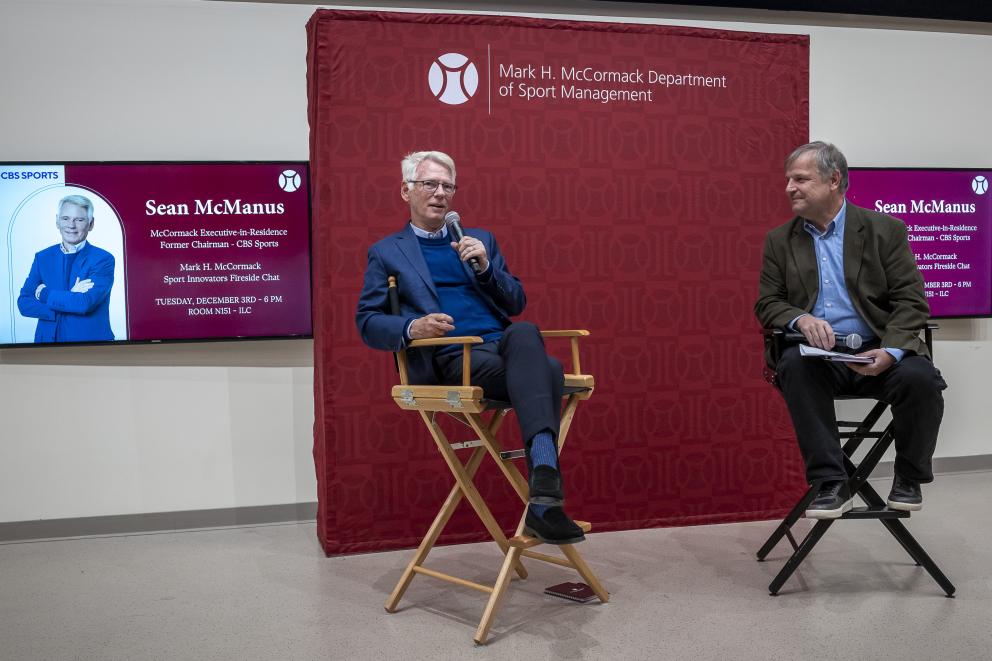McCormack Executive-in-Residence 2024: Sean McManus, Past President of CBS Sports
June 13, 2025

Sean McManus was destined to become a trailblazer in sports television. The son of legendary sports broadcaster Jim McKay, McManus’s career began at the age of twelve years old. Now, more than 50 years later, McManus has retired after 28 years as the head of CBS Sports, where he was instrumental in many of the innovations seen in sport broadcast television today.
Named the 2024 McCormack Executive in Residence, McManus spent three days sharing his knowledge and experience with McCormack students and faculty, highlighted by a fireside chat with esteemed sport media journalist John Ourand on December 3, 2024.
He discussed his time as president of CBS Sports starting in 1996, where he created CBS Sports Network, supervised multiple Super Bowl broadcasts, and negotiated rights deals to broadcast games, including the rights to bring the NFL back to CBS in 1998. McManus’s accomplishments earned him 22 Emmy awards, the Cynopsis Sports Media legacy award, and induction into both the Broadcasting and Cable Hall of Fame (2010) and the Sports Broadcasting Hall of Fame (2016). In 2005, McManus became the second person ever to simultaneously lead both a sports division and a news division of a major network when he was named President of CBS News.
Early Career
For decades, Jim McKay was one of the most recognized sports broadcasters in America. Best known for hosting the Wide World of Sports, McKay introduced America to many different sports, while simultaneously introducing his son to sports television. McManus began travelling with his father to different events at the age of seven years old and soon realized sports television was his calling.
At age 12, McManus made his first professional foray into sports television, working as a “gopher” on productions of his dad’s broadcasts. Making coffee runs and grabbing sodas for producers, McManus earned himself some money and dipped his toes further into the industry by doing freelance work throughout high school.
Upon graduating from Duke University in 1977, McManus was brought on as an associate producer at ABC at the age of 22. Deciding he should work somewhere different from his father, McManus left ABC for a similar role with NBC in 1979. He quickly showed his natural talents and rose up the ranks. At the age of 27, Sean McManus became the youngest vice president in NBC history when he was named VP of program development for the company.
At NBC, McManus was responsible for programming and took part in the negotiation of broadcast rights for the NFL, the Olympics, Wimbledon, and other sporting events. It was there that McManus earned his chops in media rights negotiations and acquisition, which would become a strength of his throughout the rest of his career.

The McCormack Connection
McManus had no idea that lunch with Mark McCormack would change his life and bring him one step closer to accomplishing his lifelong goal of becoming the president of a sports network. At the time, McManus was happy with his job and had no intentions of leaving NBC. But after getting some first-hand experience with McCormack’s sales skills, things changed.
“Mark asked what I wanted to do and I said I wanted to run a sports division,” said McManus. “He told me if I wanted to do that, the best move was to be on both sides of the negotiation.” He knew Barry Frank, an IMG executive, who had said he was planning to start slowing down, and suggested that McManus might take over his division. Despite his parents having some reservations, McManus trusted McCormack and Frank and accepted the offer.
McManus credits Mark McCormack with a great deal of his success and says he was one of his mentors who taught him the importance of honesty, integrity, and the art of negotiation.
“I learned something every time I was with him,” McManus said. “He was the most prepared executive you could ever imagine. He knew more about the person he was pitching than the person he was pitching with. He knew their likes and dislikes, he knew they were having trouble selling pickup trucks. He was one step ahead of everybody and he also understood the international aspect of sports marketing which is maybe the biggest reason IMG became what it came to be.”
Recognizing McCormack’s influence and impact in sports, McManus once said, “I don’t think it’s an overstatement to say that, kind of like Henry Ford and Bill Gates, Mark McCormack literally created and fostered and led an entirely new worldwide industry.”
Pivoting to CBS
It was a bit of luck that McManus landed his next role at CBS. Standing outside of a restaurant in Manhattan, McManus ran into CBS president Peter Lund and other CBS executives. Having lost NFL broadcast rights and struggling to keep up with ABC, NBC, and Fox, CBS was looking for someone new to head their sports division. McManus and Lund spoke for about 30 minutes and shortly after, McManus was given the chance to accomplish his lifelong goal.
Perhaps the greatest achievement in McManus’s career was negotiating the rights to bring the NFL back to CBS. Having been outbid by FOX for the NFL’s NFC afternoon package after the 1993 NFL season, CBS had fallen considerably as a broadcast leader, with much of their top talent leaving for other networks and their public perception deteriorating. It was now McManus’s responsibility to return CBS to the top. Knowing NBC was aiming to take Monday Night Football rights away from ABC, McManus convinced the league to negotiate the rights to the AFC’s Sunday afternoon broadcast package. After over a year of work, they agreed to a 4-year, $2 billion-dollar deal for the AFC afternoon package, which NBC declined to match. The NFL was back on CBS, and CBS was back to the top.
Landing the AFC package could not have come at a better time for CBS, as it coincided with the AFC teams becoming a force, led by the Patriots, who were just beginning their 20-year dynasty. CBS continues to own the AFC afternoon broadcast rights through the 2033 NFL season.
Beyond the NFL, McManus played a large role in negotiating rights for CBS to broadcast the PGA Tour, March Madness, the Champions League, SEC, and Big 10, among others.
In a career that took place over six different decades, McManus noticed one major constant: Sports is the most valuable product in broadcast TV, even more so now than ever before. While CBS paid $500 million in McManus’s first broadcast rights negotiation with the NFL in 1998, the price for similar agreements has more than quadrupled to billions of dollars today. This will likely only increase, especially as streaming platforms like Netflix and Amazon Prime begin to dive into the sports world.

“The big question is, will the streamers really dive into live sports?” said McManus. “We and Fox had each bid around $40 million for Wednesday night Christmas games, and Netflix came in around $100 million. The real worry is if Netflix decides they want AFC or NFC packages.”
Being a leader in sports TV, McManus also understands the role he plays in furthering the charge to showcase women’s sports as they continue their upward surge in popularity. “Advertising to women’s sports fans is smart—half the people watching the NFL are women,” said McManus. “We committed to the NWSL to put their championship in prime time. Caitlin Clark has a lot to do with the rise. Women were the stars of the Olympics. If you look where women’s sports were on television a decade ago, it’s night and day. Women’s basketball ratings for the NCAA national championship rivaled what the men’s games got.”
After being the head of a company and seeing people of many different backgrounds come through, McManus voices the importance of getting your foot in the door. “Take the first job you’re offered. It’s so hard to get into this industry, even if it’s in the mailroom at CAA where most agents have started. You don’t want to take a job that’s beneath you because there isn’t a job beneath you in your position. I started as the low man on the totem pole. Once you get in the industry, you can start to make a name for yourself.”
By Oleg Sheahan '25, a recent sport management graduate who was honored with the McCormack Student Service Award at the 2025 McCormack Awards Banquet.